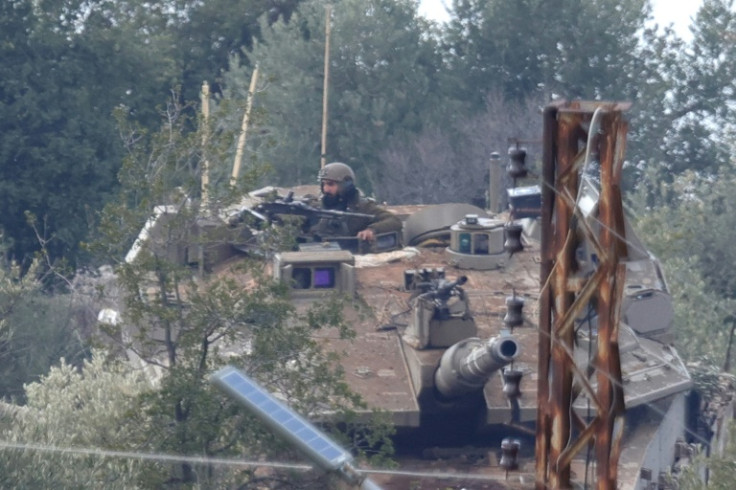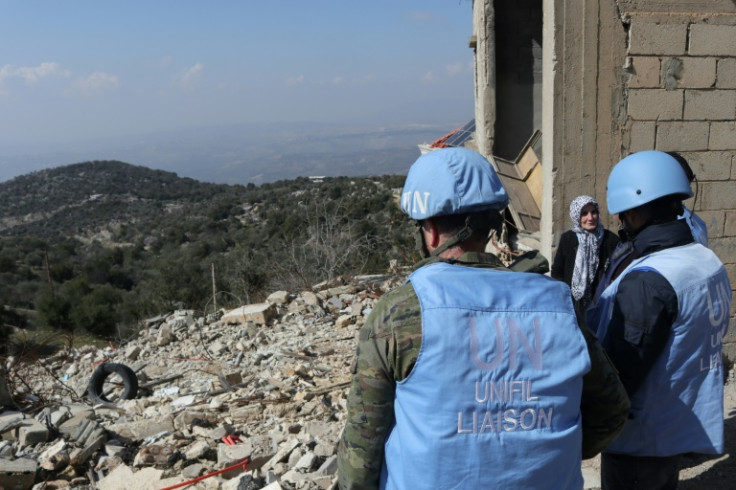Israeli Military Set To Miss Lebanon Withdrawal Deadline Despite Pushback

Israel was poised to again miss a deadline for withdrawing its troops from Lebanon after the military said Monday it would remain in five "strategic points" despite pushback from Beirut.
Lebanon's president had earlier voiced concern that Israel would miss the Tuesday deadline under a fragile ceasefire between Israel and Hezbollah, and urged countries to pressure Israel to honour the cut-off.
"Based on the current situation, we will leave small amounts of troops deployed temporarily in five strategic points along the border in Lebanon," military spokesman Lieutenant Colonel Nadav Shoshani told journalists on Monday.
He said the decision came "so we can continue to defend our residents and to make sure there's no immediate threat".
Lebanese officials have demanded Israel's full withdrawal by February 18, after Israeli forces missed an earlier January cut-off.
"We are afraid that a complete withdrawal will not be achieved tomorrow," President Joseph Aoun said earlier Monday in a statement.
"The Lebanese response will be through a unified, comprehensive national position," he added.
The Israel-Hezbollah ceasefire has been in effect since November 27, after more than two months of all-out war during which Israel launched ground operations.
Under the deal, Lebanon's military was to deploy in the south alongside United Nations peacekeepers as the Israeli army withdrew over a 60-day period that was later extended to February 18.
Hezbollah was to pull back north of the Litani River -- about 30 kilometres (20 miles) from the border -- and dismantle any remaining military infrastructure in the south.
Aoun said "the army is ready to station in towns and villages that the Israelis will withdraw from" and to "protect the border".
Lebanon was working "diplomatically to achieve the full Israeli withdrawal", he said, adding: "I will not accept a single Israeli remaining on Lebanese territory."
Israel has continued to carry out strikes on Lebanon, with the military saying Monday it killed a Hamas commander in the southern city of Sidon.
Aoun had called on "countries that helped reach the agreement, particularly the United States and France... to pressure Israel to withdraw and implement" the deal.
Paris and Washington helped mediate the ceasefire, and a committee involving the United States, France, Lebanon, Israel and UN peacekeepers is tasked with ensuring any violations are identified and dealt with.
Hezbollah chief Naim Qassem on Sunday said it was the government's responsibility to ensure the Israeli army fully withdraws by Tuesday's deadline.
During a joint address with Israeli Prime Minister Benjamin Netanyahu on Sunday, top US diplomat Marco Rubio said that "in the case of Lebanon, our goals are aligned... A strong Lebanese state that can take on and disarm Hezbollah".
Netanyahu said that "Hezbollah must be disarmed. And Israel would prefer that the Lebanese army do that job, but no one should doubt that Israel will do what it has to do to enforce the understandings of the ceasefire and defend our security."
Aoun said Monday that "the important thing is to achieve the Israeli withdrawal, and Hezbollah's weapons come as part of solutions the Lebanese agree on."
Iran-backed Hezbollah was left weakened by the war, which saw senior commanders and even its longtime chief Hassan Nasrallah killed in Israeli strikes.
Nasrallah's funeral is scheduled for February 23, and Iran said Monday it would participate in the ceremony "at a high level".
Israeli bombardment wreaked destruction on swathes of the country, particularly Hezbollah strongholds in the country's south and east, and in Beirut's southern suburbs.
More than 100,000 people are internally displaced in Lebanon, according to the UN's migration agency, and Lebanese authorities have said reconstruction could cost up to $11 billion.
Ramzi Kaiss from Human Rights Watch said Monday that "Israel's deliberate demolition of civilian homes and infrastructure" was making it "impossible for many residents to return".
The Israeli military said Monday it killed "the head of Hamas's operations department in Lebanon" in an air strike, after Lebanon's official National News Agency said a raid targeted a vehicle in the coastal city of Sidon.
In a statement, the military said Mohammed Shahine "was eliminated after recently planning terror attacks, directed and funded by Iran, from Lebanese territory against the citizens of the state of Israel".
An AFP photographer saw soldiers and first responders inspecting the mangled, burned-out wreckage of the vehicle.
Israel has repeatedly targeted Hamas officials in Lebanon since the Gaza war erupted in October 2023 and Hezbollah initiated cross-border hostilities with Israel over the conflict.


© Copyright AFP 2025. All rights reserved.





















